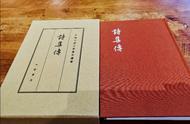
- 图片来源:学习强国
《诗经》中依体裁与音乐对诗歌所分出的类型。“风(国风)”是不同地区的音乐,大部分是民歌;“雅”是宫廷宴享或朝会时的乐歌,分为“大雅”与“小雅”,大部分是贵族文人的作品;“颂”是宗庙祭祀用的舞曲歌辞,内容多是歌颂祖先的功业。“雅”“颂”指雅正之音,而“国风”系民间乐歌,因此“风雅颂”既是《诗经》的体裁,同时也有高雅纯正的含义。“风雅”后来一般指典雅与高雅的事物。
In "The Book of Songs," the content is divided into three categories according to style and tune: feng (ballad), ya (court hymn), and song (eulogy). Ballads are music from different regions, mostly folk songs. Court hymns, divided into daya (major hymn) and xiaoya (minor hymn), are songs sung at court banquets or grand ceremonies. They are mostly the works by lettered noblemen. Eulogies are ritual or sacrificial dance music and songs, most of which praise the achievements of ancestors. Court hymns and eulogies are highbrow songs while ballads are lowbrow ones. Therefore, ballads, court hymns, and eulogies not only refer to the styles of "The Book of Songs" but also classify the songs into highbrow and lowbrow categories. Later on fengya (风雅) generally referred to anything elegant.

◎故《诗》有六义焉:一曰风,二曰赋,三曰比,四曰兴,五曰雅,六曰颂。(《毛诗序》)
所以《诗经》有六项基本内容:即风、赋、比、兴、雅、颂。
Therefore The Book of Songs has six basic elements: ballads, narratives, analogies, associations, court hymns, and eulogies. (Preface to The Book of Songs)
◎“三经”是赋、比、兴,是做诗底骨子,无诗不有,才无则不成诗。盖不是赋便是比,不是比便是兴。如风、雅、颂却是里面横丳(chuàn)底,都有赋、比、兴,故谓之“三纬”。(《朱子语类》卷八十)
《诗经》中的“三经”指赋、比、兴,是作诗的骨架,所有的诗都有,如果没有就不成诗。大概是没有赋就得有比,没有比就得有兴。像风、雅、颂在诗歌里面却起横向的连接作用,诗歌中都得有赋、比、兴,所以将风、雅、颂称为“三纬”。
The three "longitudes" of The Book of Songs refer to narrative, analogy, and association, which serve as the frame of a poem. Without these, they could not be called poems. If narrative is not used in a poem, analogy must be used; if analogy is not used, association must be employed. Ballads from the states, court hymns, and eulogies play a connecting role in the poems. Since the poems have narrative, analogy, and association serving as the "longitudes," ballads from the states, court hymns, and eulogies are therefore called the three "latitudes." (Classified Conversations of Master Zhu Xi)
(推荐:教育部 国家语委 供稿:北京外国语大学 外语教学与研究出版社)
,














